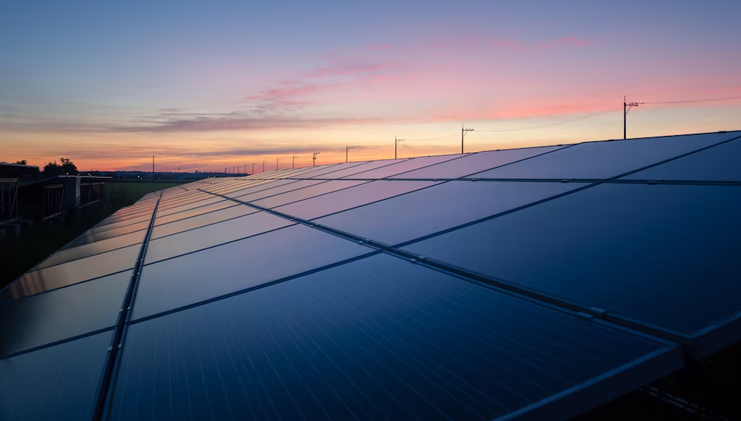
Harnessing Solar Power - A Sustainable Energy Solution for Your Home
Solar power has changed the game in a society battling with the pressing need for sustainable energy options. Solar energy harnesses the sun's abundant energy. The energy is processed into a clean, sustainable, and unbounded source.
Solar power has skyrocketed as we seek to slow down climate change. Also, the increase in the price of fossil fuel and electricity has triggered the need for renewable power technologies like solar power. It proves to be a more economical solution.
Globally, the potential of solar energy has expanded. As per TheRoundUp.Org, the world's solar energy capacity in 2022 was 850.2 GW (Gigawatts). But, the global renewable energy capacity is expected to grow by 2400 GW, which is almost 75%, by the year 2027.
Similar to this, there are various other notable findings in the sector of solar technology that are worth learning. With this blog, we aim to do the same. Dive in to explore
- How solar energy systems are connected and interact with the electrical grid.
- Types of off-grid solar solutions and applications
- Benefits of off-grid solar solution
Let us explore the basics of solar power to determine its viability as a sustainable energy source.
An Overview of Solar Power
Solar energy gives people and communities the power to manage their energy requirements. Homes and businesses can produce their power by mounting solar panels on their roofs. They can effectively decrease their dependency on the grid and the volatility of energy costs.
The significant price drop over time is the key factor influencing the widespread usage of solar energy. The International Renewable Energy Agency reports that during 2010, the average cost of solar panels decreased by almost 80%. With this statistic, we can assume that solar power is easily accessible now. They have become more inexpensive than ever because to cost reductions.
Solar energy has a lot of benefits for the environment. The power lowers greenhouse gas emissions and air pollution. Instead of using fossil fuels to power the system, the sun's energy has been effectively used. According to the US Environmental Protection Agency, producing solar energy cuts carbon dioxide emissions by 1,500 pounds per megawatt-hour. Solar energy significantly reduces the amount of hazardous compounds like sulfur dioxide. Even nitrogen oxides lead to air pollution, and respiratory illnesses are reduced.
How solar energy systems are connected and interact with the electrical grid?
Before we proceed further to learn the solar solutions available for residential use, it is crucial to learn how these systems get connected and interact with the electrical grid.
In the market, you will come across two types of solar solutions, known as -
On-grid solar solution - An on-grid solar solution is connected to the electrical system. It is, sometimes, also referred to as a grid-tied solar system. On the production of electricity through solar panels, the electricity is used to power the electrical loads in the building or home. If the solar panels generate more electricity than is currently being consumed, the excess power is fed back into the grid.
This surplus energy is usually credited or compensated by the utility company through a process known as net metering.
Perks include,
- Ability to sell excess electricity to the grid, potentially earning credits or income.
- Grid acts as a virtual energy storage system. This ensures a stable power supply even when solar generation is low (e.g., during the night or cloudy days).
Off-grid solar solution - An off-grid solar solution, also called a standalone or independent solar system, operates independently of the electrical grid. These systems are designed to meet the needs of a property entirely using solar energy. They also feature a battery bank that stores the energy.
The solar panels' electricity is utilized to power immediate consumption and charge the batteries. The stored energy in the batteries is utilized to power the electrical loads when solar production is inadequate (for example, at night or when there is little sunlight).
Perks include,
- Complete energy independence from the grid, suitable for remote or rural areas with no grid access.
- Continuous power supply even during grid outages or blackouts, making them a perfect off-grid power inverter for home.
While on-grid solar solutions are beneficial, off-grid solar solutions tend to be the best bet for remote locations, especially where there is limited to no grid connectivity.
Now, let's take a look at the important components of off-grid solutions
Rooftop Solar panels- Capturing the Power of the Sun
The foundation of any solar power system for home lies in its rooftop solar panels. They work as an eco-friendly alternative to traditional energy sources. They assist by converting sunlight into power. According to recent research, solar panels can cut residential energy costs by anywhere between 50% and 80%.
You demonstrate proactive support for a sustainable future by installing solar panels. Utilizing solar energy, which produces no greenhouse emissions, can help you reduce your carbon footprint and combat climate change. You can even produce excess power with the correct solar panel system. The panel system can be put back into the grid, earning you money.
Solar inverters & Solar batteries: Redefining energy independence
Solar inverters have changed how we capture and store solar energy with batteries. These systems let you make the most of solar energy by storing extra energy produced throughout the day. This stored energy is then used in periods of high demand or when sunshine isn't available. The dependability of solar inverter with battery will put an end to blackouts.
Utilizing solar inverters with batteries reduces dependency on the grid. This, in turn, increases the self-consumption of solar power. It allows you to store excess solar energy and use it when necessary.
Homeowners that use solar inverters with batteries have less need for power produced from fossil fuels. This directly lowers their utility costs and lowers their carbon footprint. The worldwide solar inverter market is expected to reach $25.86 billion by 2026. This statistic reflects rising solar inverter with battery usage for residential and commercial applications.
Benefits of off-grid solar solutions
In various regions across the world, over 420 million users have chosen to disconnect from the traditional power grid and embrace off-grid power sources for their energy needs.
This decision is motivated by several compelling reasons that resonate with those seeking a self-sufficient and eco-conscious lifestyle.
1. Freedom from the Grid
In blackout-prone areas, the allure of off-grid solar solutions lies in the liberation from grid dependency. Unlike traditional setups reliant on external utility companies, off-grid enthusiasts generate their own power. This ensures an uninterrupted supply even during grid outages or crises.
The power crises in many regions across the globe highlight the vulnerability of grid-dependent homes during emergencies, reinforcing the appeal of energy autonomy.
2. Environmentally-Friendly Choices
With concerns about climate change on the rise, the eco-conscious aspect of going off-grid gains significant traction.
When homeowners decide to harness renewable resources like solar, wind, or hydropower, they drastically reduce carbon emissions compared to grid-based electricity primarily sourced from fossil fuels.
Off-grid living becomes an empowering means to mitigate environmental impact and champion sustainable energy practices.
3. Greater Energy Awareness:
Connected to the grid, energy consumption can be an afterthought for many. This is because there is little awareness of where the electricity originates or how it's utilized.
In contrast, off-grid living instills a heightened sense of energy awareness. Users closely monitor energy generation. This ensures sufficient power for their needs. Also, actively re-evaluating consumption habits can optimize efficiency and minimize waste.
4. Versatility of Off-Grid Solutions
For properties nestled in remote and off-the-grid locales, traditional grid connections may prove impossible or come at prohibitive costs. This is where off-grid solar stands out as a highly practical solution.
Solar power systems can be deployed virtually anywhere, providing reliable electricity without the need for costly grid extensions or dependence on expensive backup generators.
5. Energy Resilience and Security
Off-grid solar solutions provide energy resilience and security, especially during times of utility fluctuations or disruptions.
Grid-tied systems are susceptible to power outages caused by storms, natural disasters, or maintenance issues. In contrast, off-grid homes equipped with solar power and battery storage can continue to function autonomously. This ensures a stable power supply even in challenging circumstances. Also, the independence from utility grid fluctuations grants peace of mind.
As a property owner, you know that essential electrical needs will be met regardless of external factors, making off-grid living a practical and reliable choice for energy security.
The Final Thought on the Solution
The market for solar energy is expanding, and this suggests that the transition to a solar-powered society is proceeding smoothly. Installing a solar power system for home will help you reduce your carbon impact. You can also save money on electricity and create a cleaner, greener world. Now is the ideal time to adopt solar power due to breakthroughs in solar technology. Numerous solar options are now available because to its rising affordability and accessibility. Together, let's capture the sun's energy so that we can create a more sustainable future for ourselves and future generations.
At Eastman Auto & Power Limited, you will find affordable and profit-potential off grid solutions for solar power. We uphold a collection of Panels, inverters and batteries for consumers that will work as smart financial decisions. Get better results on our website to know more about each and every product we offer.

